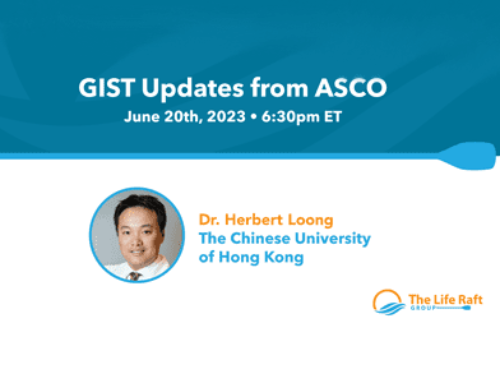 ASCO (American Society of Clinical Oncology) is the world’s leading professional organization for physicians and oncology professionals caring for people with cancer. Their mission is to conquer cancer through research, education, and the promotion of the highest quality patient care. Each year medical, oncology professionals, and patient advocacy organizations gather to share information at the ASCO Annual Meeting. This year the ASCO20 Virtual Event is happening May 29th -30th.
ASCO (American Society of Clinical Oncology) is the world’s leading professional organization for physicians and oncology professionals caring for people with cancer. Their mission is to conquer cancer through research, education, and the promotion of the highest quality patient care. Each year medical, oncology professionals, and patient advocacy organizations gather to share information at the ASCO Annual Meeting. This year the ASCO20 Virtual Event is happening May 29th -30th.
More than 40 submitted abstracts were about GIST this year. LRG’s Senior Director of Research, Pete Knox has summarized the ten key studies relating to GIST below.
Key Studies in GIST
Notable Authors: Ping Chi, Bill Tap (MSKCC)
Conclusions (from Abstract): This study met its primary endpoint. BINI plus imatinib is highly effective in treatment-naive advanced GIST, with expected and manageable long-term treatment-associated toxicities. The combination strategy warrants further evaluation in direct comparison with imatinib in the frontline treatment of GIST.
Comments: This drug has the potential to compete with imatinib as a first line treatment for advanced GIST patients. Toxicity profile is fairly good. Patients may still progress after the drug in some cases, but some durable responses were noted (up to 159 weeks, with 13 of the 38 patients still in the trial at time of abstract submission. Will be interesting to see if this drug gets approved for advanced GIST by the FDA based on this data.
Notable Authors: Tsuyoshi Takahashi (Japanese study)
Conclusions (from Abstract): Regorafenib demonstrated favorable activity in patients with imatinib-resistant GIST as second line therapy with acceptable toxicity. Secondary mutation in KIT might be a predictor of the efficacy of regorafenib. Clinical trial information: UMIN000016115.
Comments: Phase 2 trial for 2nd line GIST that directly compares Sutent and Regorafenib. Regorafenib arm showed a median PFS of 36 weeks vs 24 weeks for Sutent, and also mentions the usefulness of circulating tumor DNA (ctDNA) as a tool to select proper therapies. This trial could be used as evidence for Regorafenib to pursue 2nd line approval vs Sutent – will be interesting to see if that occurs.
Notable Authors: Heinrich, Bauer, Trent, Tap, Rutkowski
Conclusions (from Abstract): Avapritinib has important clinical activity in pts with advanced GIST who have no effective therapies. The ORR and DOR of avapritinib in 4L+ exceeds that of approved 2nd and 3rd line therapies and shows impressive activity in D842V and other Ex 18 mutant PDGFRA GIST. Results suggest avapritinib has the potential to change the treatment paradigm of pts with advanced GIST. Clinical trial information: NCT02508532
Comments: Unfortunately we now know that avapritinib was not approved for these indications, but this is still a noteworthy study. In addition it discusses the role of ctDNA as did the previous study. Should be interesting to see if this data is used by cutting edge clinicians to advocate for off-label use.
Notable Authors: Joensuu, Hohneberger, Baeur, Reichardt
Conclusions (from Abstract): About 50% of deaths can be avoided during the first decade of follow-up after surgery with 3-year imatinib treatment as compared to 1-year treatment.
Comments: This is not new news, but confirms earlier studies, and now has the benefit of 10 total years of review. Will be interesting to see how the 5 year study compares when data is available in the next couple years.
Notable Authors: Heinrich, George, Bauer, Ping Chi, Reichardt
Conclusions (from Abstract): Based on the 5 PRO measures assessed, when compared with placebo and best supportive care, ripretinib provided patient-benefit in advanced GIST with PRO measures of role and physical function, VAS, overall health, and overall QoL remaining stable.
Comments: One of two ripretinib studies, this one covers Quality of Life and the other the safety profile, taken together, and given ripretinib’s recent approval, this may be the study with the most current importance to come out of this session.
Notable Authors: George, Heinrich, Bauer, Ping Chi, Reichardt
Conclusions (from Abstract): Ripretinib had a favorable overall safety and tolerability profile. When stratified by alopecia and PPES, patient-reported assessments of function, overall health, and overall QoL were maintained over time. For both alopecia and PPES, onset and maximum severity occurred almost simultaneously, indicating that these events generally did not progressively worsen. These results suggest that alopecia and PPES are manageable and do not have a negative effect on function, overall health, and QoL. Clinical trial information: NCT03353753.
Comments: Could be viewed as a logical companion to the study above, shows that ripretinib is reasonably tolerable in terms of toxicity.
Notable Authors: Hohenberger
Conclusions (from Abstract): 90Y radioembolization (SIRT) offers a safe and effective treatment for patients with liver metastases of GISTs being the dominant site of tumor progression and with no drug treatment options available. In patients known to have no mutation in KIT/PDGFRA (wt, also NF-1 associated) it looks whether the results might be even more promising and SIRT could be used in early treatment lines.
Comments: Dr Hohenberger has reported success treating liver metastases with this technique for some time, and it is good to now have longer term data for confirmation. Looks like another tool in the arsenal, especially for Wild Type patients.
Notable Authors: Killian, Meltzer
Conclusions (from Abstract): In this single site, open label, phase II study in patients with SDH-deficient GIST, PHEO/PGL, and HLRCC-associated renal cell cancer guadecitabine was tolerated by the majority of patients. No complete or partial responses were observed. Clinical trial information: NCT03165721.
Comments: NIH study. Unfortunately not the responses that were hoped for, but important to report on as it was a point of emphasis for SDH-deficient patients.
Notable Authors: Vincenzi (Italian study)
Conclusions (from Abstract): This is the largest reported cohort of pts with Ex9-mutated GIST treated with either the 400 mg/day or the 800 mg/day dose of adjuvant imatinib. Although retrospective in nature, the data confirm the prognostic value of mitotic count and suggest that patients with Ex9-mutated GIST derive no additional survival benefit from the 800 mg/day dose.
Comments: For metastatic exon 9 patients, a higher dose of imatinib has been advocated for based on previous studies. This retrospective study set out to see if the same benefit could be had for adjuvant patients, and based on its results suggested it could not. Will be interesting to see what effect if any this has on those doctors who were prescribing the higher dose.
Notable Authors: Corless, Rubin, Gill, and the LRG’s own Jerry Call and Sara Rothschild 😊
Conclusions (from Abstract): We believe this will result in significantly better diagnosis and treatment for SDH-deficient GIST patients. We encourage other groups that advise on guidelines to develop similar recommendations. This is a great example of a patient advocacy group utilizing real world evidence derived from a patient registry to influence protocols for treatments that affect GIST patients on a large scale.
Comments: LRG study that worked with our SDH Consortium to offer improved guidelines for SDH testing, and ultimately was successful in changing existing pathology guidelines. This study has been covered in detail in previous issues of our newsletter, but I have included it here out of both pride and historical importance.



